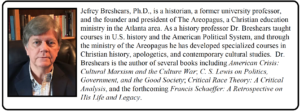Fall 2022 Seminar
How Should We NOW Live?
A Seminar in Cultural Apologetics
PART 1:
THE LIFE & LEGACY OF FRANCIS SCHAEFFER
 Instructor:
Instructor:

Dr. Jefrey Breshears
Dates and Time:
Wednesdays
August 17 – November 16
7:00 – 8:30 PM
Registration:
$60 or $100 per couple
Location:
Johnson Ferry Baptist Church, Room 105
(This course is also offered online via Zoom).
Topics and Readings:
- Jefrey D. Breshears and Eric A. Smith, Francis Schaeffer: A Retrospective on His Life and Legacy (CentrePointe Publishing, 2022)
- Francis Schaeffer, The Church at the End of the Twentieth Century (Inter-Varsity Press, 1970)
- Francis Schaeffer, A Christian Manifesto (Crossway Books, 1981)
- Francis Schaeffer, The Great Evangelical Disaster (Crossway Books, 1984)
- David Virtue, “A Collision of Two Minds: Malcolm Muggeridge and Francis Schaeffer”
- Article: “Alexander Solzhenitsyn’s Harvard Commencement Address,” 1978
- Article: “William Barr’s Address at Notre Dame”, 2019
Course Description:
“How Should We Now Live?” – Part 1 is a seminar in cultural apologetics that provides a biblically-based analysis of the current state of American culture, and how Christians can live faithfully and responsibly in the midst of a ‘post-Christian’ society that is becoming increasingly hostile toward Christian beliefs and values. In this context, this course will focus primarily on the life and legacy of Francis Schaeffer, who along with C. S. Lewis was one of the most perceptive and influential Christian thinkers of the 20th century.
Ours is a society and culture that celebrates narcissism, hedonism and materialism. In the process, virtually every area of American life is becoming secularized, socialized, sexualized and racialized under the influence of sinister forces that are waging aggressive and unrelenting attacks on morality in general and Christianity in particular. As our spiritual, moral and ethical foundations collapse, so goes our religious and cultural institutions, our economy, our political system, and any remaining standards of civility.
As Bob Dylan sang in the 1960s, “The Times They Are A-changin’,” but no one back then could possibly foresee the tectonic shift that has radically altered American society and culture in the past 50 years, or just how far our nation has strayed from its religious and cultural origins and heritage during that time. We live in a society that increasingly calls evil good and good evil (Isaiah 5:20), and as philosopher J. Budziszewski has written, this is a strange and unprecedented time.
We are passing through an eerie phase of history in which the [moral truths] that everyone really knows are treated as unheard-of doctrines, a time in which the elements of common decency are themselves attacked as indecent. Nothing quite like this has ever happened before. Although our civilization has passed through quite a few troughs of immorality, never before has vice held the high moral ground. Our time considers it dirty-minded to great sexual purity as a virtue… [and] a sign of impious pride to profess humble faith in God. The moral law has become the very emblem of immorality…. [J. Budziszewski, What We Can’t Not Know, p. 10]
“How Should We Now Live?” is an interactive study centered around directed readings and focused discussions on two seminal issues:
(1) The challenges of living in an increasingly dysfunctional and degenerate ‘post-Christian’ society and culture; and
(2) The opportunities our current situation affords in terms of practicing a faithful and wholistic vision of discipleship.
Join us for this unique, informative and stimulating study of the life and legacy of Francis Schaeffer, and what it means to understand and practice wholistic Christian discipleship in the midst of our current cultural disintegration. Never in American Christian history have the internal forces aligned against us been more formidable, and never before have American Christians needed to be better informed and engaged in the battle for all that is True, Good and Beautiful for the sake of the gospel of Jesus Christ.


